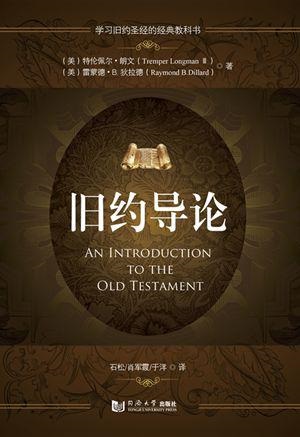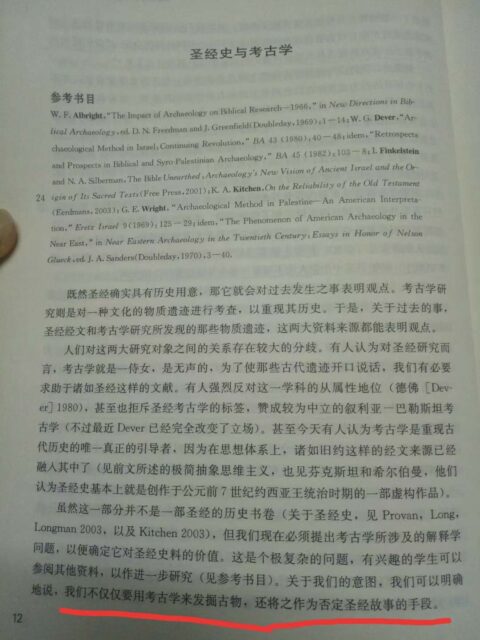
想要查询这本书的信息,才发现豆瓣已经下了,找不到了。大致信息,同济大学出版社,石松等译。
我向来不太读中文翻译的作品,所以并不太熟悉这些译作。一般而言,只有朋友推(tu)荐(cao),引起我注意,我才有兴趣评论一下。
秀丽姐贴出了这张图片,所以我简单地对照了一下原文。本书的其他部分我没有看过,无法给出整体评价,单论目前这一页:
 - - - - - -
- - - - - -
圣经史与考古学
参考书目
【略】
Biblical history follows a roughly chronological order, but chronology is not a straitjacket. Occasionally other, often thematic concerns take precedence. 【漏译。原因不明】
Since the Bible does have a historical intention, it makes claims about what happened in the past. Archaeology is the field of study that investigates the material remains of a culture to reconstruct its history. Thus two sources, the biblical text and the material remains recovered by archaeological study, make claims about the past.
既然圣经确实具有历史用意,那它就会对过去发生之事表明观点。【claims在这里翻译为“表明观点”,不是太妥当。但还过得去。】考古学研究则是对一种文化的物质遗迹进行考查,以重现【reconstruct, “重构”。意思略微不同】其历史。于是,关于过去的事, 圣经经文和考古学研究所发现的那些物质遗迹,这两大资料来源都能表明观点【“都能表明观点”?make claims about the past. 误译吧,不通。】。
The relationship between these two objects of study is highly disputed. 人们对这两大研究对象之间的关系存在较大的分歧。
Some would argue that archaeology is the handmaiden of biblical studies. The former is mute, so to give the remains voice, we must turn to texts such as the Bible. Others object strongly to such a subservient role for the discipline (Dever 1980), even rejecting the label of biblical archaeology in favor of the more neutral Syro-Palestinian archaeology (though recently Dever has reversed his position). Some today even argue that archaeology is the only true guide to reconstructing ancient history since textual sources like the Old Testament are ideologically invested (see above on minimalism as well as Finkelstein and Silberman, who argue that biblical history is largely a work of the imagination constructed during the seventh-century reign of King Josiah).
有人认为对圣经研究而言,考古学就是一侍女,是无声的,为了使那些古代遗迹开口说话,我们有必要求助于诸如圣经这样的文献。有人强烈反对这一学科【这一学科,代词的指向不明。】的从属性地位(德佛,1980).甚至也【“也”字多余】拒斥圣经考古学的标签,赞成较为中立的叙利亚一巴勒斯坦考古学【意思不明。“有人强烈反对考古学之从属地位,甚至拒绝使用‘圣经考古学’这样的学科标签,更愿意使用较为中立的‘叙利亚-巴勒斯坦考古学’。”】(不过最近Dever已经完全[completely?]改变了立场)。甚至今天有人认为考古学是重现古代历史的唯一真正的引导者,因为在思想体系上,诸如旧约这样的经文来源已经融入其中了【 since textual sources like the Old Testament are ideologically invested. 乱译。译者看懂了这句话吗?”因为旧约这样的文献,乃是意识形态的产物“。】(见前文所述的极简抽象思维主义,也见芬克斯坦和希尔伯曼。他们认为圣经史基本上就是创作于公元前7世纪约西亚王统治时期的一部虚构作品)。
This volume is not a biblical history (for which see Provan, Long, and Longman 2003; and Kitchen 2003), but we must address for a moment the hermeneutical issues involved in archaeology in order to assess its value in connection with biblical historiography. The issue is actually very complex, and the interested student should turn elsewhere for further study (see bibliography). For our purposes we can point out that the use of archaeology involves more than simply digging up artifacts and holding them up against the biblical facts.
虽然这一部分并不是一部圣经的历史书卷【误译。volume在这里是“书卷”的意思,不是指意义模糊的“这一部分”。“虽然本书不是讨论圣经历史”】(关于圣经史,见Provan, Long, Longman 2003,以及Kitchen 2003),但我们现在必须提出考古学所涉及的解释学问题,以便确定它对圣经史料的价值【表述问题。“以便确定它对解释圣经的史料价值”】。这是个极复杂的问题,有兴趣的学生可以参阅其他资料,以作进一步研究(见参考书目)。关于我们的意图,我们可以明确地说,我们不仅要用考古学来发掘古物,还将之作为否定圣经故事的手段。
最后一句话,则完全是打胡乱译。正确的意思,“对于此书的目的而言,考古学的价值绝不仅限于从地下发掘古物,并用其否定圣经的事实。”
但从这一页的翻译看来,这个译本所体现的水准较低,多处意义不明,最后一句话的意思与作者的原意甚至相悖。